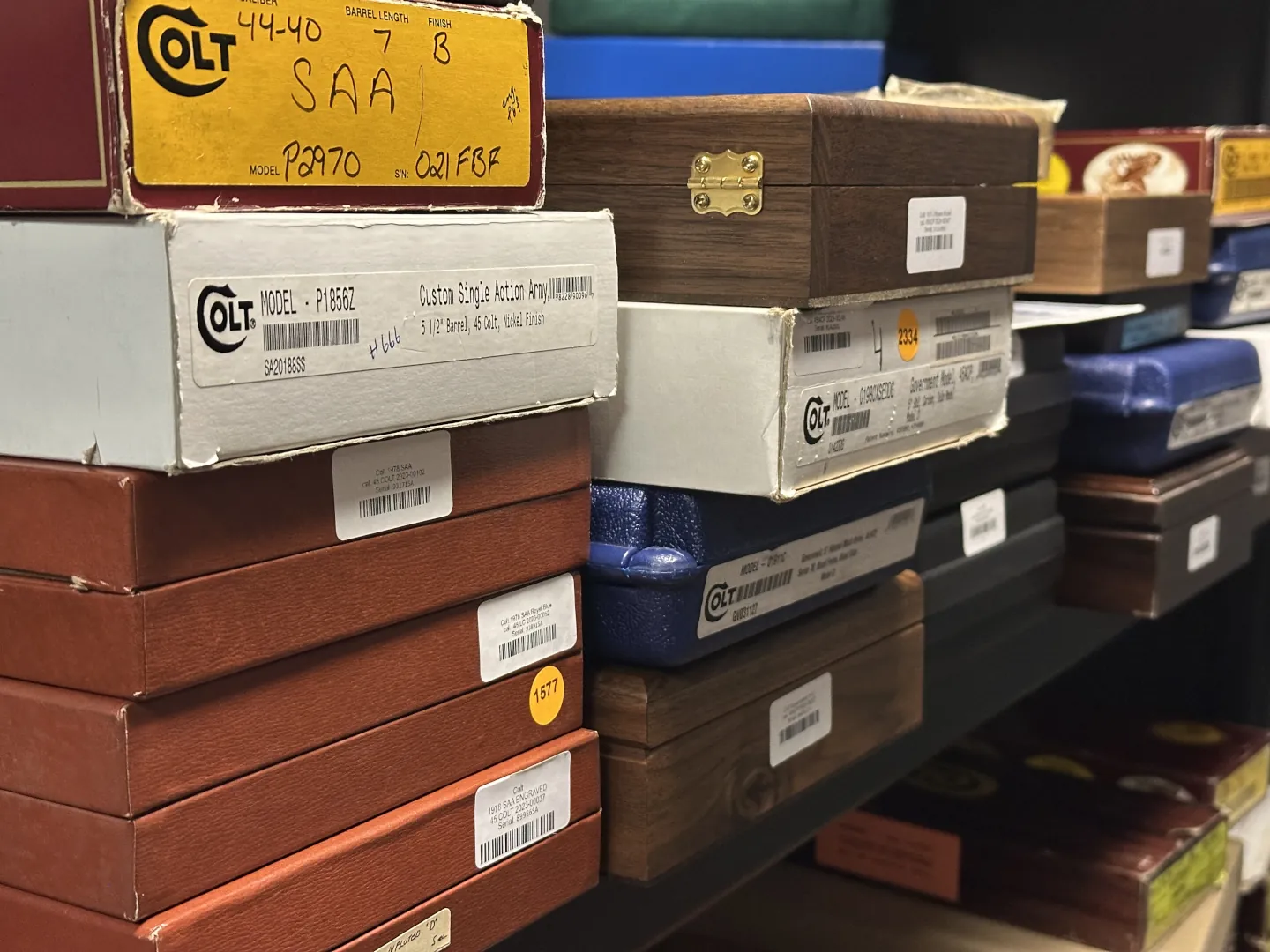The world of firearms is rich and diverse. It spans centuries, continents, and countless designs.
Estate firearms hold a special place among these. They are pieces of history, artifacts that tell stories of their time and owners.
But what happens when you decide to sell these treasures?
The process can be complex. It involves understanding the value of your firearms, navigating legal considerations, and finding the right buyers.
This guide is here to help. It will walk you through selling your estate firearms online, providing detailed insights and practical tips.
Whether you’re a seasoned firearms enthusiast, a novice shooter, or a history teacher looking for reliable information, this guide is for you.
So, let’s embark on this journey together. Let’s explore the fascinating world of real estate firearms and learn how to sell them online.
Welcome to the comprehensive guide on selling your estate firearms online.
Understanding Estate Firearms and Their Market Value
Estate firearms are a fascinating niche within the broader firearms market. They often come from personal collections, handed down through generations, and can vary widely in their historical and monetary value.
Many factors contribute to the value of estate firearms. The condition is critical, affecting both usability and aesthetic appeal. Rarity also plays a significant role; a limited production run can significantly boost a firearm’s value.
Provenance adds an essential layer of value as well. Knowing who owned the firearm and its historical context can make it more desirable. Documentation accompanying the gun, such as original receipts or maintenance records, enhances its appeal and authenticity.
Buyers are often looking for specific types of firearms to complete their collections. Understanding what makes a gun valuable can lead to more successful sales. Here’s a brief overview of factors influencing market value:
- Condition: The physical state of the weapon.
- Rarity: How many of these firearms were made?
- Provenance: The history and documentation.
- Demand: Current market interest in similar items.
These elements combine to form the market value of real estate firearms. Recognizing and leveraging them will help you achieve the best possible selling outcome.
What Are Estate Firearms?
Estate firearms can be defined in several ways. They are firearms from a personal collection, often included in an estate sale. When someone with a collection passes away, their guns may be sold as part of handling their estate.
These firearms can range from modern pieces to antique gems. People often keep them for personal reasons, passing them down through generations. Each gun can hold significant sentimental value or historical interest.
Estate firearms offer unique opportunities for buyers and sellers. For collectors, it could mean acquiring a rare or sought-after piece. For sellers, it’s a chance to share and benefit from a treasured artifact. Understanding what constitutes an estate firearm is the first step in navigating their sale.
The Historical Significance of Antique Guns
Antique guns play a crucial role in the narrative of firearms history. They are windows into the craftsmanship and technology of past eras. Each antique piece often tells stories of the period it was crafted in, reflecting historical events and cultural shifts.
Collectors cherish antique guns not only for their historical significance but also for their artistic merit. The craftsmanship in these firearms is often unparalleled, showcasing techniques and materials no longer used in modern production.
Moreover, owning an antique gun can connect you to past events, sometimes involving significant historical figures or moments. The stories these guns carry make them highly desirable in the market.
Awareness of an antique gun’s history enhances its allure and market value. This knowledge attracts enthusiasts and collectors and enriches the selling experience. For many, owning an antique gun is owning a piece of history.
Preparing to Sell Your Estate Firearms Online
Preparing to sell estate firearms online requires careful planning and understanding. The process involves various steps, each crucial to ensure a smooth sale. Producing firearms is unlike selling other collectibles due to specific legal and ethical considerations.
Firstly, familiarize yourself with relevant laws and regulations. This is critical to avoid legal complications later. Regulations vary by location, so it’s essential to understand the specific requirements in your area.
Next, accurately assess the value of your firearms. Appraising the collection helps set a realistic price that attracts buyers and ensures you don’t unintentionally undersell valuable pieces.
A quality presentation of your firearms is a must. This includes taking high-quality photos and writing compelling descriptions. Your first impressions of potential buyers online can significantly impact your sales success.
Additionally, you’ll need to select the right platform for your sale. Different platforms have varying audiences and can offer other advantages. Consider options like auction sites, specialized gun marketplaces, or selling directly to collectors.
As you prepare, consider these steps:
- Learn legal requirements for firearm sales.
- Accurately appraise your collection.
- Create compelling listings with photos and descriptions.
- Choose the right online platform.
- Ensure you are ready to handle inquiries and transactions.
Thorough preparation enhances your credibility as a seller and helps attract serious buyers. It’s more than just listing an item; it’s about showcasing its value to the right audience.
Legal Considerations and Compliance
Selling firearms involves specific legal requirements. It’s essential to be aware of these to avoid legal issues. These laws regulate who can buy and sell firearms, how they are transferred, and record-keeping requirements.
Firearm sales require adherence to local, state, and federal laws. Each level of government may have different rules, making it crucial to research comprehensively. This can include background checks and holding the necessary permits or licenses for selling.
Compliance ensures that both you and your buyer are protected. It also builds trust, showing potential buyers you respect and follow legal protocols. Knowing the legal landscape is essential for a smooth, trouble-free transaction.
Appraising Your Firearms: Value Factors
Accurate appraisal is vital before listing your firearms. This involves assessing factors that contribute to their market value. A professional appraisal can provide an unbiased estimate based on current market trends.
Condition is often the first aspect to evaluate. A firearm in excellent condition will typically command a higher price. Minor defects can affect value, so assessing and disclosing any damage is essential.
Rarity and demand also play significant roles in valuation. A rare firearm that collectors actively seek may fetch a premium price. Understanding what makes a gun rare or desirable is crucial for setting a competitive price.
Other considerations include historical significance, provenance, and matching accessories. These factors contribute to an accurate picture of a firearm’s worth. Appraisals help sellers set appropriate prices and inform buyers of a firearm’s value.
Creating an Attractive Online Listing
An appealing online listing is crucial for attracting potential buyers to your estate firearms. It goes beyond just presenting the item; it involves creating a narrative that captivates and informs. Each element of your listing should work together to highlight the firearm’s value and appeal.
Start with clear, detailed photographs that showcase the firearm from multiple angles. Prospective buyers want a comprehensive visual understanding of the item, so well-lit images that highlight key features and details are imperative.
Accompany your photos with compelling descriptions that engage the reader. These descriptions should not only list technical specs but also tell the story of the firearm. Potential buyers appreciate knowing an item’s history and unique aspects.
Include any relevant documentation or provenance with your listing. These can significantly enhance the perceived value and trustworthiness of the sale. Buyers are more likely to invest in a firearm with a documented past.
Consider these components for your listing:
- High-quality photos
- Detailed, engaging description
- Historical context or story
- Provenance or documentation
- Accurate technical specifications
Ultimately, your goal is to offer an insightful, attractive presentation. This will help buyers appreciate the uniqueness and worth of your estate firearms.
Photography Tips for Showcasing Your Firearms
Photography plays a pivotal role in making your online listing stand out. Well-executed photos can attract attention and instill buyer confidence in your listing. Here are some practical tips to enhance your images.
Firstly, use natural light whenever possible. It creates a more authentic and transparent representation of the firearm. Avoid harsh artificial lights, which can cast undesirable shadows and distort colors.
Consider the background you choose. A plain, neutral backdrop ensures the firearm is the focal point without distractions. This clarity allows potential buyers to focus entirely on the firearm’s features.
Finally, take multiple shots from different angles. Capture close-ups of significant marks, engravings, or details that distinguish the firearm. This thoroughness gives buyers a complete visual understanding of the piece.
Writing Compelling Descriptions and Stories
Descriptions in your listing should engage, inform, and persuade. Go beyond stating facts to weaving a narrative that connects with potential buyers. A well-crafted description brings the firearm’s history to life.
Begin by highlighting key features and characteristics. Mention the firearm’s manufacturer, model, caliber, and unique attributes. Precise technical specifications establish a baseline of information for the buyer.
Then, delve into the story behind the firearm. If the piece has historical significance or was part of notable events, emphasize these points. Buyers often cherish pieces with rich histories.
Finally, always maintain transparency. If there are any imperfections, mention them honestly. An honest and informative description builds trust, attracting genuinely interested buyers.
Where to Sell Your Estate Firearms Online
Choosing the right platform to sell your estate firearms is crucial for maximizing your return and reaching interested buyers. Each platform offers different benefits, depending on your needs and the specifics of what you’re selling. The ideal venue will depend on the type of firearms you have and your target buyers.
Online marketplaces provide a broad audience and ease of access. They offer a familiar shopping experience where buyers can browse a vast selection. However, competition is high, so your listing must stand out.
Consider specialized buyers who seek firearms with specific historical significance or rarity. These buyers appreciate the unique value of real guns and often pay a premium for them. Luxury auction houses and niche dealers can also be viable options for significant collections.
It’s Assessing each platform’s fees and terms is essential. Understand whether the platform takes a commission, charges listing fees, or has particular requirements for sellers. Transparency is key to ensuring you’re comfortable with the selling terms.
Safety in transactions should also be a priority. Choose platforms that offer secure payment methods and protection against fraud. Secure systems can provide both sellers and buyers with peace of mind.
Platforms to consider include:
- General online marketplaces
- Specialized firearm dealers
- Luxury auction houses
- Niche online communities
- Classifieds for enthusiasts
Identify which platform aligns best with your firearm collection and sales goals.
Selling to Specialized Buyers Like Luxus Capital
Specialized buyers such as Luxus Capital present a unique opportunity when selling estate firearms. These buyers focus on high-end, rare, and historically significant firearms and offer a tailored selling experience.
Luxus Capital is known for valuing the uniqueness and provenance of antique and vintage guns. They often look for pieces that tell a story and have historical importance. This focus can enhance the perceived value of your firearms to these buyers.
Engaging with a specialized buyer involves ensuring your firearms’ documentation is thorough. Detailed provenance can significantly increase interest and potential offers. Buyers like Luxus Capital appreciate the transparency and added historical context.
Utilizing Online Auctions and Marketplaces
Online auctions and marketplaces open your firearms to a vast global audience. These platforms offer dynamic selling environments where buyer interest can drive final prices higher. Auctions create a competitive atmosphere that often benefits the seller.
Choose an online auction platform that aligns with the type of firearms you’re selling. Platforms dedicated to firearms provide knowledgeable audiences and specific search categories. This targeting can increase the visibility and appeal of your listings.
Participation in these platforms typically requires meeting specific legal and procedural requirements. It’s crucial to familiarize yourself with these steps to ensure a smooth selling process. Proper listing, clear photos, and accurate descriptions are vital for attracting serious bidders.
With numerous options, selecting the right marketplace or auction site is key to achieving your sales objectives.
Shipping and Transaction Security
Ensuring the safe delivery of your estate firearms is as crucial as securing the transaction. Shipping firearms involves specific legal requirements and regulations that must be followed meticulously. This ensures compliance with federal and state laws and protects both parties involved.
When preparing to ship a firearm, it’s essential to package it securely. Proper packaging prevents damage during transit and maintains the firearm’s condition. Use sturdy materials and ensure the gun is unloaded before shipping.
The transaction also requires ensuring that you’re paid securely. Fraud can occur, especially in online transactions, so being proactive about security is vital. To mitigate risks, utilize platforms known for their secure payment processes.
Both sellers and buyers are often concerned about scams, which are unfortunately common. Identifying and avoiding fraudulent activities can save time, money, and stress. Being vigilant about the transaction details and the buyer’s reputation is essential.
Documentation plays a vital role in secure shipping and transaction processes. This includes retaining proof of shipment and payment receipts. Such records are invaluable for resolving any disputes that may arise.
Key points for security include:
- Using certified shipment methods
- Ensuring the legality of the shipment destination
- Leveraging secure payment processors
- Retaining shipping and transaction records
- Being aware of potential fraud indicators
Ensuring these steps are followed can make the process smooth and secure for all parties involved.
Legally Shipping Firearms to Buyers
Shipping firearms legally requires attention to various regulations. These rules vary by jurisdiction, so becoming familiar with state and federal laws is crucial. Complying with these regulations avoids legal issues and ensures your shipment arrives safely.
Most firearms must be shipped to a licensed firearm dealer, an FFL (Federal Firearms Licensee). This requirement ensures the firearm is transferred legally and responsibly. Sellers should confirm that the receiving party holds a valid FFL.
Documentation should accompany every shipment. This includes a copy of the purchaser’s FFL, shipment tracking, and required permits. Keeping thorough records helps if any questions arise later about the transfer.
Ensuring Secure Payment and Avoiding Scams
The internet presents opportunities and risks for sellers, and payment security is a top concern. It is advisable to use trusted payment gateways with buyer-seller protections, like PayPal or credit card transactions. These platforms often offer dispute resolution processes to handle any issues.
Scams in online transactions can take many forms, from fake payment notifications to fraudulent chargebacks. Confirm payment receipt through your bank before shipping any firearms to avoid these risks. Always verify the buyer’s identity and address.
It is key to maintain vigilance throughout the sale process. This includes watching for red flags like unusual buyer behavior or persistent requests for financial information. Some sellers also choose to use escrow services, which hold the payment until delivery confirmation, adding another layer of security.
Marketing Your Estate Firearms
Effective marketing is key to successfully selling estate firearms. Engaging the right audience ensures your collection attracts serious buyers. Marketing strategies should highlight your firearms’ unique aspects, emphasizing their historical value and condition.
Crafting a compelling message is essential. The description should capture the attention of collectors and enthusiasts alike. It should provide insights into the firearm’s history, rarity, and any notable features that set it apart.
While traditional advertising has merits, the digital realm offers a broader reach. Online platforms allow sellers to connect with a diverse audience and offer numerous tools to showcase collections effectively. From detailed descriptions to high-quality images, digital platforms enable sellers to present their estate firearms at their best.
List of strategies to consider for effective marketing:
- High-quality photographs showcasing every detail
- Detailed, engaging descriptions that tell the firearm’s story
- Utilizing search engine optimization (SEO) techniques
- Connecting with online forums dedicated to firearms
- Posting in gun classifieds and auction sites
Engaging with potential buyers via these platforms requires effort and strategy. Understanding your audience is the first step in optimizing any marketing campaign.
Reaching the Right Audience
Finding the right buyers involves more than just listing on a popular site. Tailored marketing strategies can attract a specific audience interested in your type of firearms. Understanding what appeals to collectors or enthusiasts is critical.
Collectors often look for particular manufacturers, models, or historical pieces. Highlighting these aspects in your marketing material can capture their interest. Detailed documentation and background stories enhance the appeal, particularly to history buffs.
Joining specialty forums and communities focused on estate firearms and collectibles can also be beneficial. These platforms offer a space to connect and network with individuals who share an interest in the types of guns you’re selling.
Leveraging Social Media and Digital Marketing
In today’s connected world, social media is a powerful tool for reaching potential buyers. Platforms like Facebook, Instagram, and YouTube allow you to showcase your firearms effectively. Videos can demonstrate the operation and unique aspects, engaging viewers more deeply than text alone.
Developing a digital marketing strategy involves consistent engagement. Regular posts about your firearms collection, updates on auctions, and interesting facts can keep potential buyers interested. Collaborating with influencers in the firearms community can also boost visibility.
Search engine optimization (SEO) is crucial when creating your online listings. Optimized content ensures your ads appear when potential buyers search-relevant keywords. Targeted advertising on social platforms can further refine your reach, ensuring your marketing efforts focus on those most likely to purchase.
After the Sale: Follow-Up and Customer Service
Selling estate firearms is just the beginning. Exceptional post-sale service cements a positive reputation, encouraging future transactions. Ensuring smooth communication with buyers can lead to repeat business and strong referrals.
Addressing any post-sale inquiries promptly is crucial. Buyers might have questions or need assistance after receiving their purchase. Being responsive and attentive can alleviate concerns and foster trust.
Returns are an inevitable part of selling anything online. Handling them with professionalism and courtesy reflects well on you as a seller. A clear return policy should be in place to manage buyer expectations smoothly.
Customer service extends beyond resolving issues. Follow-ups can be an opportunity to engage buyers further. Sending a thank-you message or requesting feedback can leave a lasting impression.
Creating a list of best practices for exceptional customer service:
- Quick and precise responses to inquiries
- Establishing a fair and transparent return policy
- Offering follow-up engagement and feedback options
- Maintaining professionalism in all communications
These practices ensure a smooth transaction process, enhancing the experience for you and the buyer.
Handling Post-Sale Inquiries and Returns
Efficiently managing post-sale inquiries requires organization and attention. Buyers appreciate detailed answers, so being informed about the firearm’s specifics is beneficial. Responding quickly ensures your reputation as a reliable seller.
Returns, while challenging, can be managed smoothly with a well-defined policy. Transparency about the conditions under which returns are accepted prevents misunderstandings, so communicating these terms clearly from the start is paramount.
Handling returns graciously, even when inconvenient, demonstrates your commitment to customer satisfaction. This approach not only resolves immediate issues but also encourages positive future interactions.
Building a Reputation as a Trusted Seller
Trust is invaluable in the world of estate firearms sales. Cultivating a trustworthy reputation involves consistent quality and reliability. Buyers will return if they know they can depend on your honesty and professionalism.
Delivering on promises is crucial. Ensuring that firearms are accurately described in listings prevents any disappointments. Satisfied buyers are your best advocates; they can influence others through word-of-mouth recommendations.
Offering exemplary customer service reinforces your standing as a trusted seller. Going above and beyond, addressing concerns promptly, and honoring commitments enhance your business image. Over time, these practices contribute to a solid reputation, attracting more enthusiasts to your estate firearms collection.
Additional Considerations for Selling Estate Firearms
When selling estate firearms, it’s essential to consider factors beyond the sale itself. Tax obligations and ethical considerations form a critical part of the process. Understanding these aspects ensures compliance with legal standards and fortifies your reputation as a conscientious seller.
Another crucial consideration is the role of historical documentation. Provenance can significantly influence a firearm’s value and appeal. A well-documented history enhances the item’s allure and provides transparency to potential buyers.
These documents, such as original purchase receipts or service records, offer insights into the firearm’s past. They can corroborate authenticity and increase buyer confidence. Many collectors seek detailed histories when making purchasing decisions.
Here’s a checklist to enhance your estate firearm selling process:
- Ensure compliance with tax obligations related to sales
- Uphold ethical standards in all transactions
- Gather and present historical documentation for each firearm
- Maintain transparency about the provenance and any modifications
- Encourage open communication with potential buyers
Being mindful of these elements solidifies your credibility in the marketplace. Addressing these considerations effectively can make a significant difference in achieving successful sales outcomes.
Tax Implications and Ethical Selling
Selling estate firearms may have tax implications. Researching and understanding the tax rules applicable to firearm sales in your region is essential. Consulting a tax professional can provide clarity and help you prepare accurately.
Ethical selling practices are vital. They involve honesty and integrity in all transactions. Ensuring firearms are described truthfully, and any defects disclosed sets the stage for fair dealings.
Understanding the ethical dimensions of your sales helps build trust and safeguards against potential legal complications. Ethical selling benefits you and your buyers, fostering a more harmonious marketplace.
The Role of Historical Documentation and Provenance
Provenance plays a pivotal role in the collectible value of estate firearms. Knowing a firearm’s history can transform it from a mere weapon into a cherished artifact. Buyers often seek documented histories that confirm a firearm’s lineage.
Gathering comprehensive historical documentation supports transparency. This could include military records, manufacturer details, or previous ownership histories. These elements enrich the narrative and appeal to collectors who value heritage.
Beyond its narrative value, provenance provides proof of authenticity. It reassures buyers of the firearm’s originality and true historical significance. In the collector’s market, a well-documented history can substantially enhance the firearm’s desirability and value, making it a worthwhile investment for both you and your buyer.
Conclusion: The Rewarding Experience of Selling Estate Firearms
Embarking on the journey to sell your estate firearms can be an enriching experience. This process involves understanding the technical and historical aspects of firearms and enhances your appreciation for their craftsmanship and legacy. Each weapon carries a unique story, and sharing that with a new owner can be fulfilling.
Successfully selling estate firearms requires careful preparation and attention to detail. Each step demands precision, from legal compliance and accurate appraisals to compelling listings. These efforts not only maximize the value of your collection but also ensure smooth, ethical transactions.
Engaging with a community of collectors, enthusiasts, and history buffs can be particularly rewarding. Such interactions offer insights into market trends and buyer preferences and provide opportunities for learning and networking within the broader firearms community.
Ultimately, selling estate firearms is more than just a transaction; it’s a connection to history and a contribution to preserving these artifacts for future generations. Each sale can offer personal satisfaction, financial gain, and the joy of seeing cherished firearms enter new homes where they will be equally valued and appreciated.
FAQs About Selling Estate Firearms Online
Selling estate firearms online can seem daunting, but understanding the common questions can ease the process. Here, we answer some frequently asked questions.
Estate firearms are guns that are part of an inheritance or collection. They may range from antique pieces with historical significance to more modern firearms. Typically, these items are valued for their history, craftsmanship, or rarity.
Several factors, including age, condition, and rarity, determine the value. Other elements to consider are the manufacturer’s reputation and historical significance. Appraisals from a qualified expert can provide an accurate market value.
Yes, selling firearms online is legal, but specific regulations apply. Complying with federal, state, and local laws, which may include background checks and transfer requirements, and properly documenting the transaction ensures that it adheres to the law.
Numerous platforms facilitate online sales, including specialized auction sites and marketplaces. Selling to a niche buyer like Luxus Capital can benefit rare or antique pieces. Researching various options helps you find the best fit for your firearms.
An attractive listing is crucial. High-quality photos and well-written descriptions highlighting the firearm’s unique features can draw more interest. Including historical context or stories related to the gun can further engage potential buyers.
Absolutely. Ensure secure payment methods and verify buyers through trusted platforms. Avoid sharing personal information unnecessarily, and be aware of red flags like unusually high offers or reluctance to follow standard procedures. Using escrow services can also provide an extra layer of security.









